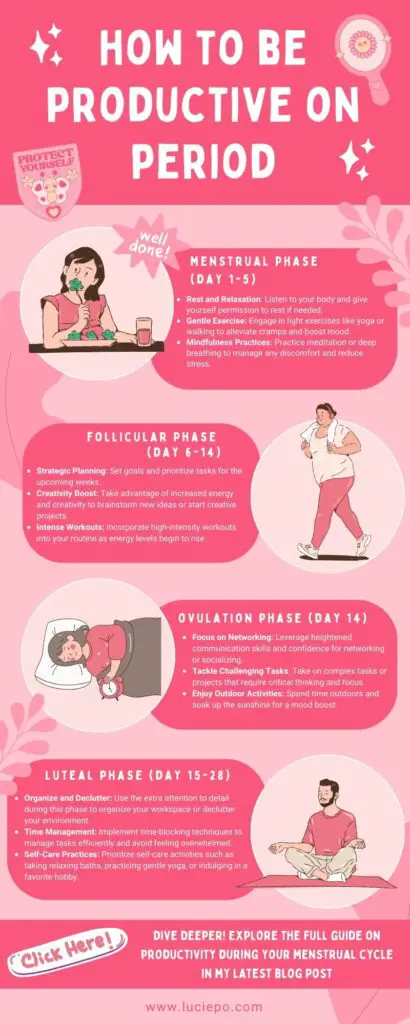
How to Be Productive on Period: Effective Strategies for Managing Energy and Tasks
Managing productivity during your menstrual cycle can be a challenging task, but with the right strategies and understanding of your body’s rhythms, it’s entirely possible to maintain efficiency. Your period doesn’t have to be an obstacle to your work or daily activities.
By embracing the cyclical nature of your body and learning how certain phases of the menstrual cycle can influence both physical and mental states, you can tailor your schedule and to-do list to harness these natural variations in energy and concentration.
Let’s dive into ”How to be productive on period”!

To stay productive throughout your cycle, it’s essential to align your workload with your energy levels. During certain phases, like the follicular phase after your period ends, you might find yourself more energetic and focused. This time can be ideal for tackling tasks that require creativity or strategic thinking.
Conversely, during your period, when energy may wane, focusing on lighter tasks or practicing self-care can keep you from being overwhelmed. By paying attention to these shifts and planning accordingly, you can optimize your workflow and maintain productivity without straining yourself.
Key Takeaways
- Align tasks with the energy highs and lows of your menstrual cycle.
- Use strategic planning to enhance productivity and accommodate natural rhythms.
- Self-care during low-energy periods can help maintain overall productivity.
Understanding Your Menstrual Cycle
Your menstrual cycle is a complex system influenced by various hormones, primarily estrogen and progesterone. It’s crucial to recognize the different phases and hormonal fluctuations to optimize your well-being and productivity.
Phases of the Menstrual Cycle
- Menstrual Phase: This begins on Day 1 of your cycle, which is the first day of bleeding. Your body is shedding the uterine lining, with period lengths varying between individuals, typically lasting 3 to 7 days.
- Follicular Phase: Following menstruation, the follicular phase starts, involving the growth of follicles that house the eggs. It ends with ovulation and includes the latter part of the menstruation time, often making up approximately the first half of the cycle.
- Ovulatory Phase: Ovulation occurs midway through the cycle and is characterized by the release of an egg. This period can range from 16 to 32 hours in which the egg is viable for fertilization.
- Luteal Phase: Post-ovulation, the corpus luteum develops and this phase begins. Typically lasting around 14 days, it ends just before menstruation starts.
Hormonal Fluctuations and Their Effects
- Estrogen and Progesterone Levels: The balance of estrogen and progesterone, the two key reproductive hormones, governs the ebb and flow of the menstrual cycle. Their levels rise and fall in a predictable pattern each cycle.
- Hormonal Influence: During the follicular phase, estrogen is predominant and generally contributes to heightened energy and mood. Conversely, in the luteal phase, higher progesterone levels can lead to a sense of calm or, for some, premenstrual symptoms.
Understanding the subtleties of your hormonal cycle helps in predicting fluctuations and aligning your activities with your body’s natural rhythms, thus supporting a more productive lifestyle.
Tracking and Planning

To master your monthly cycle, it’s essential to first understand and track your personal patterns. This knowledge empowers you to make informed decisions, allowing you to optimize your schedule for varying energy levels and mitigate PMS symptoms.
Cycle Syncing Strategies
You can tailor your workload to different phases of your menstrual cycle by cycle syncing. During the follicular phase, when energy is on the rise, tackle demanding projects. As you transition into the luteal phase and energy wanes, shift your focus to less intensive, administrative tasks. This adaptive approach aligns your tasks with natural fluctuations in vigor and concentration.
Utilizing Tracking Apps
There are many tracking apps available, but the Flo app stands out for its holistic approach. By consistently inputting data on your cycle, energy levels, and PMS symptoms, MyFlo helps you anticipate each stage of your cycle. It can offer recommendations on diet, exercise, and productivity that are in harmony with the current phase of your menstrual cycle, refining your strategy for staying on top of your game.
Optimizing Energy and Productivity

In managing your menstrual cycle, certain adjustments can significantly enhance both your energy levels and productivity. Adjusting your diet and exercise routines can be especially fruitful.
Dietary Adjustments
Your diet plays a crucial role in how you feel and function throughout your menstrual cycle. During your period, focus on iron-rich foods such as spinach or red meat to compensate for iron loss, which could boost your energy. Include complex carbohydrates like whole grains to maintain energy levels, and stay hydrated to help reduce feelings of fatigue.
Iron-Rich Foods:
- Spinach
- Red Meat
Complex Carbohydrates:
- Whole grains
- Legumes
Stay Hydrated:
- Water
- Herbal teas
Effective Exercise Routines
Engaging in light to moderate exercise, such as yoga or walking, can improve your blood flow and elevate endorphin levels, potentially enhancing your mood and energy. As you transition into the days following your period, introducing more intense activities like running or cycling can help in reclaiming your peak fitness and power, aiding in overall productivity.
During Period:
- Yoga
- Walking
After Period:
- Running
- Cycling
Managing Symptoms and Discomfort

Effectively managing your menstrual symptoms can be critical for maintaining productivity. Below are targeted approaches to alleviate PMS and cramps and advice on when it may be necessary to consult healthcare professionals.
Natural Remedies for PMS and Cramps
Diet and Hydration: Increasing your intake of fibrous foods and hydrating can help alleviate PMS symptoms. Eating fish, eggs, and a variety of vegetables and fruits provides essential nutrients. Consuming foods high in magnesium, such as nuts and seeds, is recommended, as magnesium can help reduce cramps. Additionally, it’s advisable to avoid excessive salt to prevent bloating.
Exercise: Engaging in regular physical activity, such as brisk walking for 30 minutes a day, can improve blood circulation and reduce cramp intensity.
Heat Therapy: Applying a heat pad or hot water bottle to the lower abdomen is a time-honored method to ease menstrual cramps.
Tea: Certain herbal teas have properties that can soothe discomfort. For instance, ginger tea may decrease inflammation and help with pain, while chamomile tea can be relaxing and assist with sleep.
When to Seek Medical Attention
You should not hesitate to get a professional opinion if your menstrual discomfort is moderate to severe. Persistent or extreme pain can sometimes be an indicator of a more serious health problem. If you find that natural and at-home strategies are insufficient to alleviate your symptoms, scheduling a visit with your obstetrician-gynecologist (ob-gyn) or healthcare provider is a prudent step.
Additionally, if PMS symptoms severely impact your mental health or day-to-day functioning, this could also warrant a discussion with a healthcare professional.
Enhancing Concentration and Mood

During your period, it’s key to focus on both your mental and physical environment to maintain concentration and manage mood fluctuations. Mindfulness and structured organization can significantly impact your ability to stay productive and keep a positive mood.
Mindfulness and Stress Management
Practicing mindfulness during your menstrual cycle helps in recognizing and dealing with mood changes that can affect learning and concentration. Simple mindfulness exercises, such as deep breathing or guided meditations, can be potent tools for stress management. Scheduled short breaks throughout your day to engage in these practices can help refocus your attention and reduce feelings of overwhelm.
Workspace Organization Tips
A cluttered workspace can lead to a cluttered mind. To enhance attention to detail, take time to organize your workspace at the beginning of your work session. Keep only what you need for your current task on your desk, ensuring everything has its place. Limit your exposure to social media and other online distractions by using website blockers or scheduling specific times to check your accounts.
Bold Tip: Turn off non-essential notifications on your devices to prevent interruptions and stay on task.
- To-Do List: At the start of the day, create a prioritized list of tasks to avoid getting sidetracked.
- Email Times: Set specific times to check your email, so you’re not constantly breaking your concentration.
Utilizing these strategies can help you navigate the challenges of your menstrual cycle with greater ease, keeping your productivity on track.
Cultural and Psychological Impacts
Your menstrual cycle can significantly influence your emotions and mental health due to fluctuating hormones, such as estrogen and testosterone. During your period, hormonal changes are at the root of mood changes that can range from feelings of irritability to full-blown depression. It’s important to understand that these feelings are a common part of the cycle and not a reflection of your stability or abilities.
Social and cultural context also plays a role in your experience of menstruation. In some cultures, there are taboos and stigmas attached to menstruation, which can lead to feelings of shame or discomfort. This can affect your psychological state, fostering a need for reflection on how societal attitudes impact your well-being. Despite the negativity, there has been a shift in recent times, with more open discussions on platforms like social media, helping to normalize menstruation.
Here is a quick breakdown of how you may feel during the menstrual cycle:
- Pre-menstrual phase: You might feel tense or emotional due to the drop in estrogen.
- Menstrual phase: You may experience fatigue and a need for self-care.
- Post-menstrual phase: Often comes with a rise in energy and mood.
During each of these phases, hormonal fluctuations can affect your productivity. Recognizing these patterns can empower you to plan your tasks in alignment with your energy levels. Embrace this natural cycle and utilize it to maximize your efficacy.
Lifestyle Considerations for Healthy Cycles
Managing your menstrual health involves a proactive approach to sleep and balancing the demands of work and personal life. These lifestyle choices can have a profound impact on your overall well-being and the regularity of your cycle.
Importance of Regular Sleep Patterns
Your body relies on consistent sleep to regulate hormones effectively, including those responsible for your menstrual cycle. Aim for 7-9 hours of quality sleep each night to support your hormonal balance and reduce stress levels. A regular sleep routine can improve your mood and contribute to healthier cycles. Avoid caffeine and electronic devices before bedtime, as these can interfere with your ability to fall asleep.
Navigating Work and Personal Life Balance
Balancing workplace demands with self-care can be challenging but is essential for your health and menstrual regularity. Optimize work productivity around your cycle by scheduling demanding tasks during times you feel most energetic. Leveraging stress management techniques such as mindfulness or gentle exercise during the workday can also alleviate mental strain. In your personal life, prioritize activities that bring relaxation and joy, as reducing stress can contribute to regular periods and may have beneficial effects if you’re considering pregnancy. If necessary, explore birth control options with your healthcare provider to regulate testosterone levels and menstrual cycles.

Technological Tools for Menstrual Health
Embracing technology can play a pivotal role in managing your menstrual health. Through the use of various apps and digital tools, you can gain valuable insights into your cycle, helping you make more informed choices to boost your productivity.
Period-Tracking Apps:
- Flo: Utilize this app to monitor your menstrual cycle and symptoms. By keeping track of your period dates, Flo can help predict your cycle and provide personalized health insights.
- MyFlo App: Developed by hormone expert Alisa Vitti, this app goes beyond simple tracking. It offers tailored advice on how to adjust your diet, exercise, and schedule according to the phases of your menstrual cycle.
Features to Look For:
- Detailed tracking options for symptoms and cycle variations
- Educational content about hormonal health
- Personalized lifestyle recommendations
- Data analysis to spot trends over your cycles
Why Use a Menstrual Health App?
- Predictive Analytics: Understand when your next period will likely start.
- Lifestyle Adjustments: Tailor your work and social commitments to your cycle phases to stay productive.
- Symptom Management: By noting your symptoms, you may start to see patterns and learn effective ways to manage them.
Selecting the right app, such as Flo or the MyFlo App, can empower you with knowledge and help you manage your menstrual health proactively. Remember, consistency in logging your information will provide the most accurate and helpful results.
Frequently Asked Questions
Managing your period while maintaining workplace productivity can be challenging. These FAQs address common concerns, providing practical advice and strategies to help you during menstruation.
How can I maintain focus during menstruation?
During menstruation, it’s not uncommon to experience fatigue and difficulty concentrating. Prioritizing tasks and breaking them into smaller, manageable pieces can help sustain your focus. Limit face time at work during this phase and emphasize solo activities when possible.
What strategies can I use to stay productive at work while on my period?
To stay productive, listen to your body and adjust accordingly. On days when symptoms are mild, tackle more demanding tasks. If you’re feeling more severe effects, focus on simpler work tasks that don’t require intense concentration. Keeping a flexible task list can be incredibly beneficial.
Are there methods to cope with period discomfort during working hours?
Yes, there are effective methods to cope with period discomfort during work. Over-the-counter pain relievers, heat patches, or a warm water bottle can alleviate cramps. Regular breaks and light stretching can also minimize discomfort. For hygiene and comfort, ensure you have access to proper menstrual products and facilities.
What is the impact of menstruation on workplace productivity?
Menstruation can cause a range of symptoms, such as cramps and mood swings, which may impact productivity to varying degrees. Being aware of how your body responds and adapting your work plan can help mitigate these effects.
How should I communicate the need for menstrual leave to my employer?
If you require menstrual leave, plan a private conversation with your employer. Communicate your needs confidently and propose a plan for how your responsibilities will be managed in your absence. It’s important to discuss how such leave could lead to better performance overall.
Is it acceptable to have a less productive day at work due to menstruation?
It’s perfectly acceptable to have a less productive day at work due to menstruation; many people experience this. Recognizing that productivity may ebb and flow during your cycle allows for better planning and ensures that high-priority tasks are aligned with your high-energy days.
What’s the best time to start new projects during my cycle?
The follicular phase, which occurs after menstruation, is often considered the best time to start new projects due to increased energy and motivation.
How do estrogen levels impact productivity?
Higher estrogen levels, typically in the follicular phase, can enhance cognitive function, mood, and energy levels, positively impacting productivity.
When is the ideal phase for tackling intense strength training sessions?
The follicular phase, when estrogen levels are rising and energy levels are high, is optimal for intense strength training sessions.
Can hormone levels affect my ability to focus during important meetings?
Yes, fluctuations in hormone levels, particularly estrogen and progesterone, can impact cognitive function and focus during different phases of the menstrual cycle.
What’s the most productive way to navigate the premenstrual syndrome (PMS) phase?
Prioritize self-care practices such as exercise, healthy eating, and stress management to alleviate symptoms and maintain productivity during the premenstrual phase.
How does progesterone rise influence productivity levels?
The rise in progesterone during the luteal phase can lead to feelings of relaxation and decreased energy levels, potentially impacting productivity.
Is the ovulation phase the peak time for creative energy?
Yes, the ovulation phase, when estrogen levels peak, is often associated with heightened creativity and innovative thinking.
How does the infradian rhythm affect productivity throughout the month?
The infradian rhythm, which governs the menstrual cycle, influences energy levels, cognitive function, and mood, impacting productivity across different phases.
When is the best time to schedule deep work sessions according to my cycle?
The follicular phase is typically the best time for deep work sessions, characterized by increased energy, focus, and motivation.
What strategies can alleviate period pain to maintain productivity?
Strategies such as exercise, heat therapy, over-the-counter pain relievers, and relaxation techniques can help alleviate period pain and support productivity.





